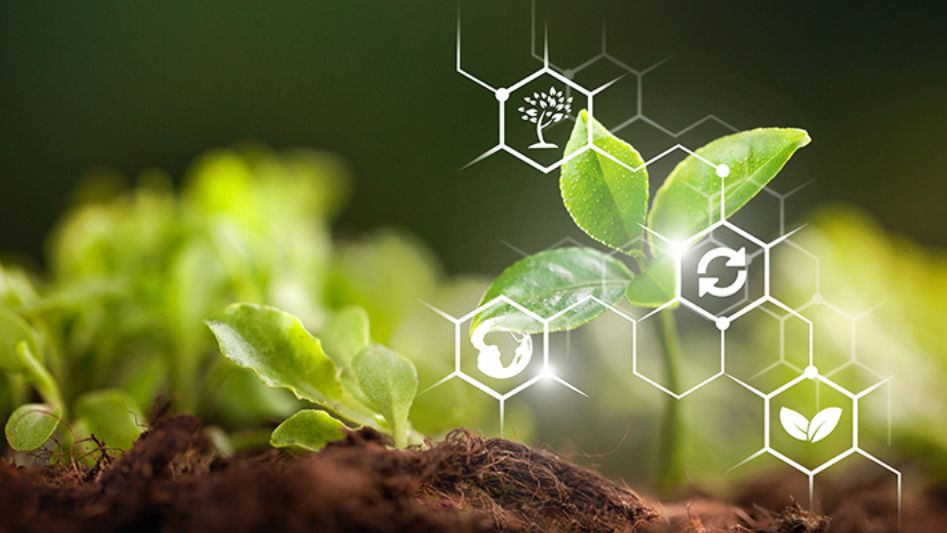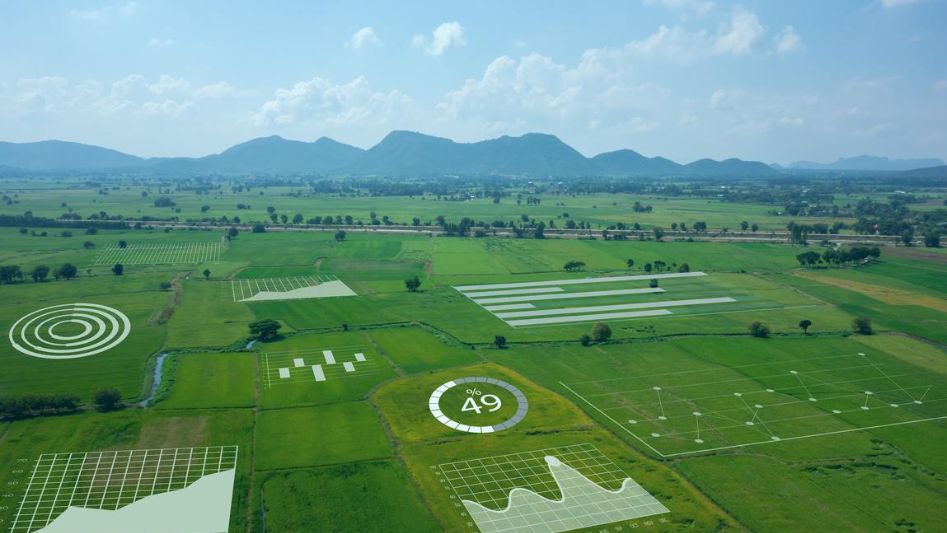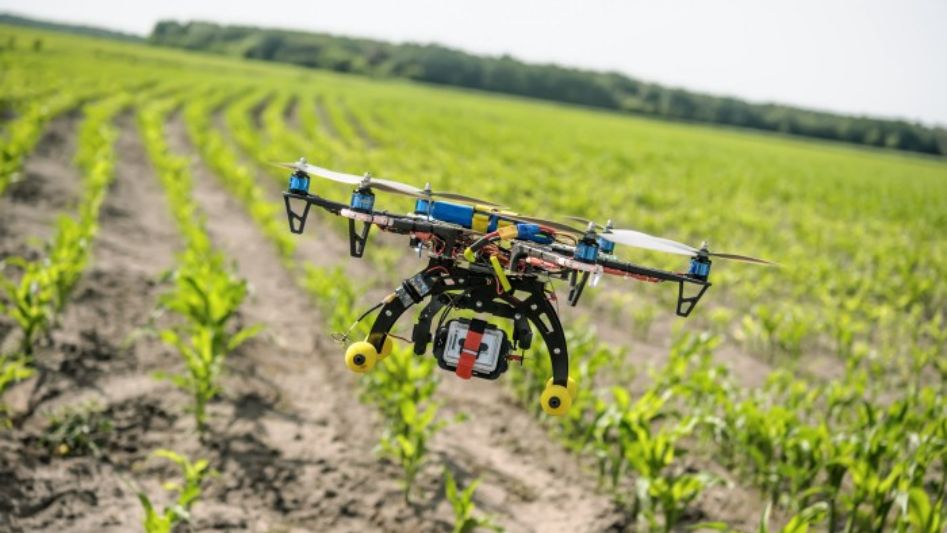As the world’s population continues to grow, the demand for food is increasing, and agricultural practices must adapt to meet this demand. One way to improve agricultural efficiency and sustainability is through the use of Artificial Intelligence (AI) technology. AI can help farmers optimize their crop yields, reduce waste, and conserve resources. In this article, we will explore the role of AI in agriculture and how it can improve efficiency and sustainability.
Table of Contents:
We invite you to read: “THE ROLE OF AI IN EDUCATION: TRANSFORMING THE WAY WE LEARN”

The Benefits of AI in Agriculture
AI technology has the potential to revolutionize the agriculture industry. It can help farmers make informed decisions, increase productivity, and reduce waste. Here are some of the ways AI can benefit agriculture:
Precision Agriculture
Precision agriculture is a farming practice that uses technology to optimize crop yields while minimizing waste. AI technology can analyze data such as soil quality, weather patterns, and plant health to help farmers make informed decisions about when to plant, fertilize, and harvest crops. This can lead to higher yields, reduced waste, and lower costs.
Automated Machinery
AI technology can be used to automate machinery such as tractors and harvesters. This can save time and reduce the need for human labor, which is particularly useful for large-scale farming operations. Automated machinery can also be more precise, leading to more efficient use of resources.
Predictive Analytics
AI technology can be used to analyze large amounts of data to predict future trends in crop yields, weather patterns, and market demand. This can help farmers make informed decisions about which crops to plant and when to harvest them. Predictive analytics can also help farmers reduce waste by predicting which crops are most likely to spoil.
Pest and Disease Control
AI technology can be used to monitor crop health and identify pests and diseases. This can help farmers take preventative measures to protect their crops, reducing the need for pesticides and other harmful chemicals. By reducing the use of pesticides, farmers can reduce their environmental impact and save money on costly chemicals.
How AI is Currently Being Used in Agriculture
AI technology is already being used in various ways in the agriculture industry. Here are some examples:
Crop Monitoring
AI technology can be used to monitor crop health and identify problems such as nutrient deficiencies, pests, and diseases. This information can then be used to make informed decisions about when to apply fertilizers or pesticides and which crops to harvest first.
Soil Analysis
AI technology can be used to analyze soil quality, including nutrient levels and pH. This information can then be used to make informed decisions about which crops to plant and when to plant them.
Automated Irrigation
AI technology can be used to automate irrigation systems, ensuring that crops receive the right amount of water at the right time. This can reduce water waste and improve crop yields.
Robotic Harvesting
AI technology can be used to automate the harvesting process. Robots can be programmed to identify ripe fruits and vegetables and pick them without damaging the plant. This can reduce labor costs and improve efficiency.
We invite you to read: “THE ROLE OF AI IN MARKETING: USING MACHINE LEARNING TO DRIVE SALES”

Challenges in Implementing AI in Agriculture
While AI technology has the potential to revolutionize the agriculture industry, there are also challenges that must be addressed. Here are some of the challenges in implementing AI in agriculture:
Data Privacy
AI technology requires large amounts of data to be effective. However, this data must be collected and stored securely to protect farmers’ privacy. Farmers must be assured that their data will not be used for purposes they did not intend.
Cost
AI technology can be expensive to implement, particularly for small-scale farmers. Governments and other organizations must provide funding to ensure that all farmers can benefit from this technology.
Education
Farmers must be trained to use AI technology effectively. This requires education and training programs to be put in place to ensure that farmers can take full advantage of the benefits of AI technology.
Technical Expertise
AI technology requires technical expertise to implement and maintain. Farmers may need to hire experts or partner with technology companies to ensure that the technology is used effectively.
Infrastructure
AI technology requires reliable internet connectivity and access to electricity. Farmers in remote or rural areas may not have access to these resources, which can limit their ability to take advantage of AI technology.
We invite you to read: “THE FUTURE OF ROBOTICS: HOW AI IS CHANGING THE FIELD”

Conclusion
AI technology has the potential to revolutionize the agriculture industry by improving efficiency and sustainability. It can help farmers make informed decisions, increase productivity, and reduce waste. However, there are also challenges that must be addressed, such as data privacy, cost, education, technical expertise, and infrastructure. Governments, technology companies, and agricultural organizations must work together to ensure that all farmers can benefit from AI technology.
The Role of AI in Agriculture: Improving Efficiency and Sustainability is an important topic that will continue to gain attention as the world’s population grows and the demand for food increases. By leveraging AI technology, farmers can help meet this demand while also reducing waste and conserving resources.
FAQ
How can AI improve agricultural efficiency and sustainability?
AI technology can help farmers optimize their crop yields, reduce waste, and conserve resources. It can be used for precision agriculture, automated machinery, predictive analytics, and pest and disease control.
What are the benefits of precision agriculture?
Precision agriculture can lead to higher yields, reduced waste, and lower costs. By analyzing data such as soil quality, weather patterns, and plant health, farmers can make informed decisions about when to plant, fertilize, and harvest crops.
How can AI help reduce the use of pesticides?
AI technology can be used to monitor crop health and identify pests and diseases. This can help farmers take preventative measures to protect their crops, reducing the need for pesticides and other harmful chemicals.
How can farmers be trained to use AI technology effectively?
Farmers can be trained to use AI technology effectively through education and training programs. These programs can be provided by governments, technology companies, or agricultural organizations.
You May Also Like
- CAN AI FLY AN AIRPLANE WITHOUT A PILOT? FIND OUT HERE!
- THE FUTURE OF BLOCKCHAIN: TRENDS AND PREDICTIONS FOR 2023
- THE ETHICAL IMPLICATIONS OF AI
- THE FUTURE OF AI: WHAT TO EXPECT
- HOW CAN AI SUPPORT DIVERSITY, EQUITY, AND INCLUSION?
HELPFUL LINKS
- Role of Artificial Intelligence in Advancing Sustainable Development Goals in the Agriculture Sector
- 5 Ways AI can Improve Environmental Sustainability
- How Artificial Intelligence Improves Agricultural Productivity and Sustainability: A Global Thematic Analysis
- Artificial Intelligence in Agriculture: Rooting Out the Seed of Doubt
- How AI is improving agriculture sustainability in India


Recent Comments